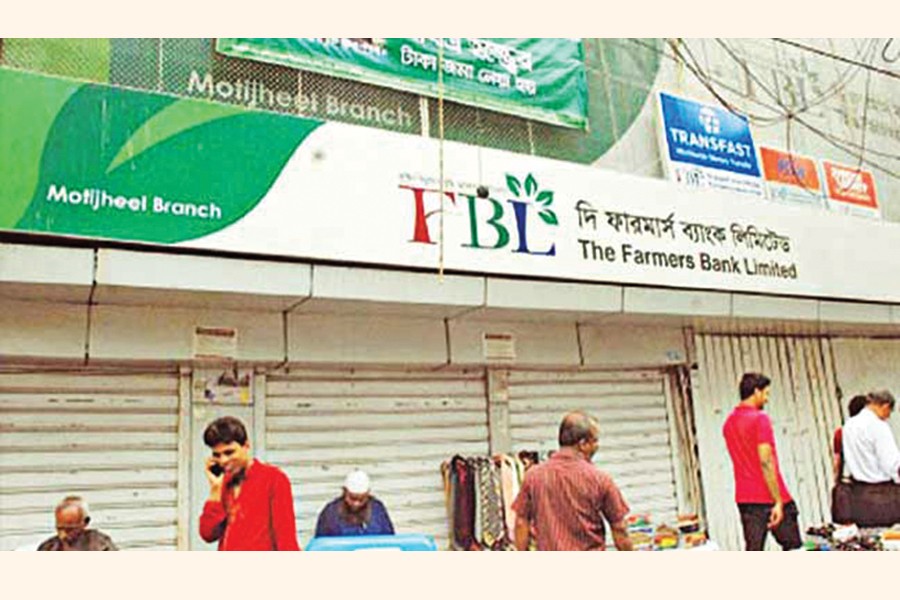Four state-owned commercial banks (SoCB) and a financial institution will inject Tk 7.15 billion as equity into the troubled Farmers Bank Limited in an attempt to salvage it.
Managing directors and chief executive officers of the Sonali, Janata, Agrani and Rupali banks and Investment Corporation of Bangladesh (ICB) discussed the issue at a meeting at the central bank in Dhaka on Thursday evening, with Bangladesh Bank (BB) Governor Fazle Kabir in the chair.
In light of the decision taken earlier by the government, each state bank will provide Tk 1.65 billion as equity to the Farmers, while the ICB will inject Tk 550 million into the fourth-generation private commercial bank.
Talking to the FE, a senior official of the central bank said the boards of all five public lenders would finalise the investment process within the next week.
"We're facilitating the implementation of the process," the central banker said.
He also said the injected fund would be treated as paid up capital. The bank's authorised capital is now Tk 15 billion.
On February 7, finance minister AMA Muhith told reporters that a move was under way to save the Farmers Bank and the process is under consideration.
The government can't allow a bank to fail, he said, adding: "Bank failure is a horrible thing for any country."
Earlier on January 14, Chowdhury Nafeez Sarafat was elected as the new chairman of the Farmers, replacing Mohammad Masud.
The troubled bank is now facing liquidity crisis mainly due to high credit growth compared with its deposit, according to the BB officials.
The bank's advance-deposit ratio (ADR) has exceeded 85 per cent in the last several months, which is not compatible with the central bank's rules, they said.
The central bank had earlier set the safe limit of ADR at 85 per cent for conventional banks and 90 per cent for Sharia-based Islamic banks.
Earlier on 27 November last year, the board of directors of the bank was reconstituted with the election of a new chairman and a vice-chairman.
Mohammad Masud and Maruf Alam had been elected chairman and vice-chairman respectively.
The same day, Muhiuddin Khan Alamgir, a ruling Awami League lawmaker and former minister, resigned as the bank's chairman. The bank's audit-committee chairman and director, Mahabubul Haque Chisty, alias Babul Chisty, also stepped down.
On December 19 last, the central bank removed the Farmers Bank's MD and CEO AKM Shameem on charges of his alleged failure in liquidity management.
On the other hand, the BB governor advised the state lenders to slash their interest rates on term-deposits for other banks gradually to help keep the interest rate on lending stable.
The state banks are now charging maximum 10.50 per cent interest rate on term-deposit for other banks, especially private commercial banks, which have also contributed to the spike in overall interest rates on lending in the banking sector, according to the bankers. The state banks are enjoying a comfortable satiation on liquidity as the public enterprises prefer depositing their funds with the public banks.
Meanwhile, Transparency International Bangladesh (TIB) on Thursday expressed concern over recurrent failures of Farmers Bank to return clients' deposit and detect its new loan scams by the central bank.
It also called for giving their deposit back by confiscating the shares of the responsible persons instead of injecting fund to overcome the liquidity crisis of the bank created due to corruption and loan forgery. TIB demanded exemplary punishment to those responsible for the Farmers Bank's crisis aiming to regain the confidence of the depositors and establish sound environment in the financial sector.
In a statement, TIB executive director Dr Iftekharuzzaman said it has been found from various media reports that Farmers Bank has been failing to repay depositors' money due to severe mismanagement including disbursement of loans beyond the deposit amount. The recent apprehension of the central bank regarding uncertainty to get back less than half of the loans disbursed by the bank has created disappointment and mistrust among the clients, he added. "The former directors of the board of the bank cannot avoid liability for such harassment of the clients created due to corruption and forgery," he said.
Mr Zaman also said the biggest scam happened at Farmers Bank during the tenure of the former chairman and audit committee chairman. "Their involvement in irregularity-based loan approval had been detected in the report of Bangladesh Bank (BB)."
A section of the board of directors approved the loans in favour of ineligible and dishonest people by exercising power and influence in exchange of commission, setting a shameful example of moral degradation.
"It is not acceptable that the perpetrators will go scot-free despite stealing the customers' money, keeping them in anxiety and fear. The culprits must be punished following due legal procedure," he said.


